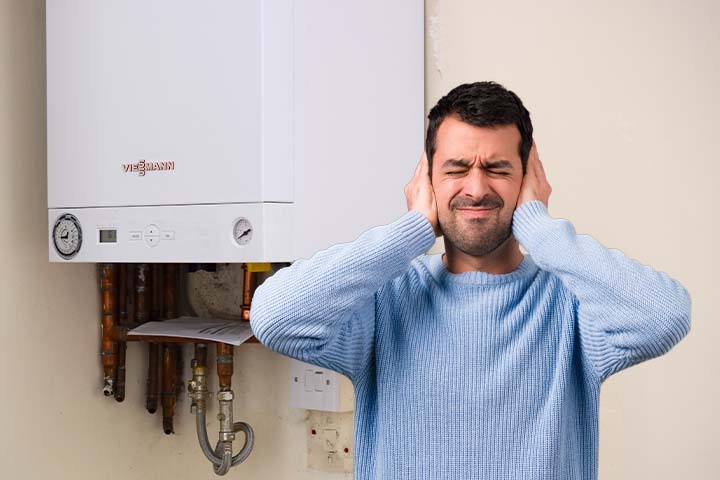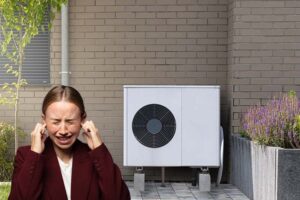Table of Contents
Do you have a noisy boiler with a loud vibration that is worrying you? Boilers sometimes become noisy, especially if they are old or have not been serviced. A loud vibrating sound can be unsettling or downright scary, but in most cases, the cause is simple and easy to fix.
The silver lining is that it’s often an easy fix. It could be the result of loose parts, the air in the lines, or the water flow. At other times, it can be the result of an underlying problem like a faulty pump.
In this blog, we will break down the most common reasons for the noises of your boiler and what you can do to fix it — explained simply. Let’s take a look!
How Noisy Sounds Can Affect Boiler Operations?
Banging sounds are most often the result of air in the pipes or loose parts in the system. They can also be a sign of the water flow being restricted. This can make the boiler work more than it should, wasting energy and putting stress on the system.
If the banging continues, the boiler can shut off for safety. Your house will take longer to heat or the radiators won’t be hot. That is a neon sign to call in an engineer and get it checked.
Do Boiler Noises Affect Its Efficiency?
Yes, they can. Strange or loud sounds produced by the boiler indicate that the boiler is not running the way it should. If the boiler is banging, vibrating, or gurgling, it could be using more power than it should. Fixing the noise is not only about silence. It is also about correct energy-saving boiler maintenance.
Air Source Heat Pump Grants
What Gurgling Sounds Could Mean?
These gurgling sounds generally mean that the pipes have air trapped in them or that the lines are clogged. When the water can’t flow freely, it’s harder for the heat to flow throughout the house. This causes the boiler to work overtime to merely heat the house.
The result? Higher energy bills and an inefficient heating system. Repairing this by bleeding the radiators or having the system serviced will bring back efficient, smooth heat.
Boiler Making Loud Vibrating Noise: Is It Dangerous?
A vibrating boiler can be an indication that something is amiss. It can be due to loose components, a faulty pump, or the wrong direction of water flowing through the system. Although it is not always dangerous, it should never be overlooked.
Vibrations can cause your boiler to heat your house less efficiently. You can expect to see rooms heat unevenly or the radiators to only be warm. They can become increasingly worse, damage the boiler, or even cause it to fail.
It’s always wise to call in a Gas Safe registered engineer if the boiler is vibrating.
Why Is My Boiler Making a Loud Noise?
Boilers will make some noise when they’re in use — it is to be expected. You will hear the soft whoosh, the quiet hum, or the noise of the water circulating through the pipes. But if the noise is loud, unusual, or abrupt, it is most likely to indicate that something’s wrong.
1. Limescale Build-Up (Also Called Kettling)
If you live in an area with hard water, limescale can build up inside the boiler, especially around the heat exchanger. It chokes the water flow, causing the water to boil, bubble, and make a noise like a kettle. That’s why it’s called “kettling”.
It’s harmless, but it can damage your boiler if it’s allowed to build up. Yearly maintenance can catch limescale before it becomes problematic.
2. Trapped Air
Air can be trapped in the heating system. It can make banging or gurgling sounds. It typically happens when hot water moves through the pipes and cools. Bleeding the radiators should do the trick.
3. Creaking or Banging Pipes
On other occasions the noise isn’t even the boiler itself — it’s the pipes. When the pipes aren’t firmly anchored in position, they’ll move when hot water flows through them. This makes them creak, tap, or bang.
Insulation or pipe clips can reduce the noise. But if you have got limescale deposits, you will need to deep clean or replace the pipes.
4. Overheat
If it’s making squealing sounds at a high pitch, shutting off abruptly, or won’t light — it is possibly overheating. It can be because the boiler thermostat is faulty or the heat exchanger is clogged.
Overheating is an emergency issue and should be checked by a heating engineer at the earliest. It can at times be a sign that your boiler is reaching the end.
5. Loose Components
A loud rattling noise will often signal that you have loose parts in the boiler — like a faulty pump or loose pipes. When parts are loose, they vibrate and cause the whole device to shake.
6. A Leak in the System
An improperly functioning boiler can make strange noises when water leaks or dribbles on hot parts. Leaks can be internal to the boiler or in the pipes around it.
It is better to avoid trying to fix this yourself. Have a professional find and fix the leak for you.
Recognizing Different Types of Boiler Noises
Boilers make all types of noises, and some are normal but others are indicative that something is amiss. Let’s go through the most frequent boiler noises, what they mean, and what you can do about them in the simplest terms.
Why is my Boiler Whooshing or Vibrating?
If the boiler is making a whooshing or vibrating sound — at times like a loud hum — it typically suggests that something’s wrong. It can be because:
- An improperly operating pump — moving too quickly or vibrating inside.
- High pressure — pushing the water through the system too quickly.
- Blocked flue — to prevent air from passing freely.
- In need of service — when parts are depleted or need to be repaired.
There is a pump circulating hot water around your system. When it’s faulty or circulating too fast, it can make the boiler vibrate. Valves can also hum when the pressure is too high. And if the flue (the pipe that expels air) is blocked — by leaves or even the bird’s nest — the boiler will whoosh.
How to Fix a Vibrating or Whooshing Boiler?
This is what you can do to fix it:
1. Check the pump
Look at the pump — is it shaking or moving? If it’s moving too fast, that’s likely to be the problem. You’ll likely need to hire the services of a heating engineer to slow it down. Especially if you’ve got a combi or system boiler since the pump is typically contained within the boiler.
2. Tighten loose screws
If it is shaking, check for loose screws on the outside of the boiler and tighten them with care.
3. Check the pressure
The boiler should be at about 1 to 1.5 bar when the radiators are cold. More than this, for example, 3 bars or so, is too much. Lowering the pressure would fix the noise, but if it keeps spiking, call for the services of a heating engineer — it’s possibly faulty.
4. Inspect the flue
Get outside and look to see if anything is blocking the flue (the pipe sticking out the side of your home). Leaves or fluff? If so, brush it off carefully. You should be able to sense air if you bring your hand close to the vent. No air may be an indication of a problem that needs the services of a professional.
Boiler Making a Loud Rumbling Noise
A rumbling boiler noise can be because the system contains limescale or sludge. It blocks the water, which heats and makes a deep, rumbling sound, like the noise made by a kettle boiling. If this happens, it’s worth calling in the services of a heating engineer. They can flush the system or descale the boiler.
Boiler Making Gurgling Noises
Gurgling sounds generally mean that air is trapped in the radiators, but it can also be caused by:
- Low water pressure
- A frozen condensate pipe
- There is inadequate water in the system
Now and then, it’s normal for it to gurgle a little — it’s only hot water circulating. But if it does this frequently, it’s time to investigate a couple of things.
How to Fix a Gurgling Sound?
If the boiler is gurgling, it’s most often because the system contains air or the water flow is faulty. Here are the easy fixes:
1. Bleed the radiators
Air can become trapped in radiators, which makes them gurgle. Letting them bleed releases the air. If you don’t know how it can be done for you by a heating engineer.
2. Test the water pressure
Low pressure can also cause the water to gurgle. Look at the pressure gauge on your boiler — it should be in the green zone (1 to 1.5 bar). If it’s lower than this, use the filling loop to fill it up.
3. Inspect the condensate pipe
If it’s really cold, the condensate pipe (the one that drains water away from your boiler) will be at risk of freezing. If you notice icicles, you can melt them by pouring hot (but not boiling) water over the pipe.
4. Inspect the circulation pump
An excessively rapid pump can also cause gurgling. If the radiators are not warming or you don’t have hot water, the pump may be the culprit. It can be slowed or replaced by a heating engineer if the need arises.
Boiler is Making Kettling Noises
Kettling happens when water in the boiler is heated too rapidly to boiling temperature. It creates steam, trapping air into the system and producing a whistling sound — the same thing that happens when you boil a kettle.
The major reasons for kettling are:
- Limescale deposits reduce the flow rate.
- Leaky system with ensuing pressure issues.
- A faulty thermostat causing the boiler to overheat.
- Faulty components or boiler malfunctioning.
- A faulty pump prevented the water from flowing normally.
Kettling can damage your boiler, so get it checked by a Gas Safe registered engineer.
Boiler is Buzzing or Humming
There can be many reasons why you’re experiencing buzzing or humming noise coming from your boiler:
- Water moving too fast through the system — the pump rate needs adjusting.
- High boiler pressure — can be lowered.
- An ineffective boiler fan struggling to work.
If you’ve checked the pump speed and the pressure and the noise continues, get a Gas Safe engineer to investigate.
How to Fix a Buzzing Boiler?
Buzzing can sound like vibrating or humming. Check initially:
- Pump speed — is it too high?
- Boiler pressure — is it above the recommended level?
- Are the pipes loose or clattering?
If the buzzing does not go away, it can be due to:
- Worn-out pump bearings — you might need to replace the pump.
- A malfunctioning fan that is vibrating.
- An improperly functioning burner making strange noises.
Boiler Making Noise Like an Aeroplane Is it Dangerous
If the boiler produces an aeroplane taking-off sound, it could be serious. It normally happens when:
- The fan is faulty and is having trouble running.
- There is a problem with the air intake or the flue — obstructing airflow.
- The pump is running too fast and forcing water through the system at too high a rate.
This sound is unusual. Switch off the boiler and call for the services of a gas-safe engineer immediately.
Other Boiler Noise Issues
Here are some other issues you may face:
Boiler loud vibrating noise when firing up
If the boiler is producing a loud vibrating noise when it is started, it may be because the pump is faulty, the water pressure is too high, or the parts are loose. It can also be the result if the system contains air.
Boiler making a noise when the heating is on
A clattering boiler when the heat is on can be due to trapped air, limescale buildup (also known as “kettling”), or possibly even a blockage in the pipe. If the noise becomes louder, it’s worth having it checked by an engineer.
Combi boiler making loud vibrating noise when running hot water
If the combi boiler vibrates excessively when you use the hot water, it can be because the pump is faulty or the water flow is poor. Sometimes it can be due to excessive pressure or blockage in the heat exchanger.
How to Troubleshoot Boiler Noises?
You can try these simple steps to silence your boiler:
- Bleed the radiators: This releases any trapped air, which stops gurgling or banging sounds.
- Test the water pressure: Low pressure can make your boiler noisy. It should be around 1 to 1.5 bar when the system is off.
- Inspect pipe fittings: Loose fittings can vibrate and cause noise. Tighten loose fittings carefully.
- Clear the condensate pipe: When it’s cold, check if the condensate pipe is frozen — pour hot water over it to melt the ice.
Should the noise continue, it’s time to bring in a heating engineer.
Long-term Solutions for a Noisy Boiler
Quick fixes are all right, but the long-term solutions keep the boiler quiet and purring along:
- Regular servicing: A yearly boiler servicing by an approved engineer can spot minor problems prior to them escalating to major problems.
- System flush: Sludge builds up in the pipes year by year. You can remove it by power flush.
- Pressure checks: Sustaining the balance in the pressure avoids excessive stress on the system.
Keeping your boiler serviced guarantees fewer breakdowns, less expenditure, and a quieter home life.
Do You Need to Replace Your Noisy Boiler?
Every now and then the noisy boiler can signal the need for an upgrade. Check for a new boiler if:
- It’s old: Older than 10 to 15 years, boilers become noisy and inefficient.
- The noise won’t stop: If the noises persist even after repair, the boiler could have underlying issues.
- Burner issues: A faulty burner can cause loud noises. If the repair does not work, the boiler can be replaced.
- An engineer suggests it: If a professional recommends replacing the boiler, it’s usually the most cost-effective option.
The Bottom Line
Not only is a noisy boiler annoying, but it can also be a sign that all is not well. While some noises are harmless, others signal issues with trapped air, limescale buildup, or malfunctioning parts.
Quick fixes can be effective, but servicing and regular maintenance guarantee that your boiler is both quiet and functioning well. If the noise persists, it might be time to have it replaced.
A peaceful, comfortable home starts with a healthy boiler.
Frequently Asked Questions
If the boiler is producing noise even when it’s turned off, the issue can be due to a malfunctioning fan, faulty burner, or faulty pump. Such parts may keep running or make noise even when they’re faulty, especially in old boilers.
Banging pipes generally mean that the pressure is the problem — too little or too much water or air in the plumbing. Just like the way excess or insufficient blood pressure can hurt you, uneven boiler pressure can be harmful. It’s always better to have it checked.
The most effective way is to have the boiler serviced annually. A heating engineer can spot faults early and fix them while they are minor. If the boiler is whistling or squealing already, it would benefit from power flushing, a magnetic filter, or specific chemicals (inhibitors) to flush the blockages and reduce noise.
Some combi boilers have a pre-heat function. This is when the heat exchanger will sometimes fire to have hot water standing by when you need it — so you should expect some noise. But if the noise is every two minutes, it could be “short-cycling.” This is when the thermostat is telling the boiler to reheat small amounts of water all the time, so it’s doing more work than it needs to.



